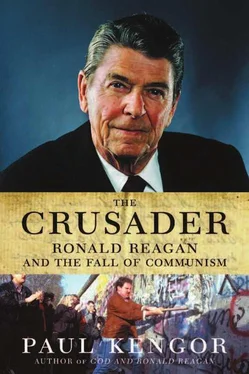74. Steven R. Weisman, “Now, Talk of New Strains Among the Top Aides,” New York Times, March 31, 1983.
75. Reagan, “Interview With Morton Kondracke and Richard H. Smith of Newsweek Magazine,” March 4, 1985.
76. Reagan quoted by Philip B. Kunhardt, Jr., Philip B. Kunhardt III, and Peter W. Kunhardt, The American President (New York: Riverhead Books, 1999), 296.
77. Reagan, “Interview With Morton Kondracke and Richard H. Smith of Newsweek Magazine,” March 4, 1985.
78. Reagan wrote this in a February 4, 1985 letter to his friend V.H. Krulak. See Skinner, Anderson, and Anderson, eds., Reagan: A Life in Letters, 122.
79. Reagan wrote this in a November 1, 1984 letter to Drs. Ivy Mooring and John Shelton of Los Angeles. The letter is in Skinner, Anderson, and Anderson, eds., Reagan: A Life in Letters, 426. For a second example in the book, see the Reagan letter to Patrick Mulvey, 425.
80. Reagan, “The President’s News Conference,” January 9, 1985.
81. Ibid.
82. Ibid.
83. Moscow International Service commentary by Viktor Vasilyev, November 6, 1985, published as “Commentary on Reagan Interview with Journalists,” in FBIS, FBIS-14-NOV-85, November 14, 1985, 1985, A9.
84. On another broadcast of “Studio 9,” Valentin Zorin said: “You know that Reagan is now possessed of dreams of star wars and the militarization of space. This has been his fixation.” See “Moscow TV’s 30 June ‘Studio 9’ Program,” transcript published in FBIS, FBIS-3-JUL-84, July 3, 1984, CC6. This take is seen in official TASS statement. To cite just two, one began and ended with the words “star wars,” noting that Reagan’s “plan” to build “space weapons” would jeopardize Soviet-American talks. The other statement quoted Soviet academician-scientist Horis Raushenbakh, who assured that Reagan’s “militarization of space” would “put an end” to the hopes for future treaties between the two superpowers. The two TASS statements are published as “Concern Over ‘Star Wars’ Plans Expressed,” in FBIS, FBIS-1-FEB-85, February 1, 1985, AA8–9.
85. Viktor Olin commentary for Moscow World Service, December 18, 1984, transcript published as “Olin Views U.S. Signing of ‘Star Wars’ Contracts,” in FBIS, FBIS-19-DEC-84, December 19, 1984, AA4.
86. F. Aleksandrov, “How the ‘Star Wars’ Are Being Prepared,” Krasnaya Zvezda , March 8, 1985, 5, published as “U.S. Preparation, Research for SDI Discussed,” in FBISFBIS MAR-85, March 12, 1985, AA5.
87. “‘Studio 9’ Program Discusses ‘Star Wars,’” May 25, 1985, transcript published in FBIS, FBIS-29-MAY-85, May 29, 1985, AA1–12.
88. See: Yuri Zhukov, “Choice,” Pravda , December 17, 1984, 6, published as “Zhukov on Reagan Administration’s USSR Policy,” in FBIS, FBIS-19-DEC-84, December 19, 1984, AA1–3.
89. Valentin Falin, “Fact and Fancy,” Izvestia , April 10, 1985, 5, published as “ Izvestia ’s Falin Muses on SDI Issue, Part 1,” in FBIS, FBIS-15-APR-85, April 15, 1985, AA3–5.
90. Yuri Gudkov, “False Promises and the Nuclear Reality,” New Times, September 1985, 3–5, published as “U.S. Strategic Doctrine Encourages Arms Escalation,” in FBISFBIS OCT-85, October 7, 1985, AA5–10.
91. TASS statement by Vladimir Matyash, October 16, 1985, published as “Reagan Uses ‘Clever Tricks’ to Explain SDI,” in FBIS, FBIS-16-OCT-85, October 16, 1985, AA5. 92. Moscow Domestic Service statement by Boris Adrianov, October 23, 1985, published as “Commentator Sees ‘Nothing Defensive’ About SDI,” in FBIS, FBIS-28-OCT-85, October 28, 1985, AA1–2.
93. In one case before his first summit meeting with Gorbachev in Geneva, he sat for a testy interview with Soviet journalists. They asked the president about “star wars”—how and why he was seeking to deploy offensive missiles in space. Reagan struggled to explain the unfortunate origins of the term—not citing Kennedy by name—how “our press picked it up,” and the subsequent “misconception” it conveyed. “We’re not talking about star wars at all,” he objected. “We’re talking about seeing if there isn’t a defensive weapon that does not kill people.” The Soviet reporters were incredulous; after all, they had gotten the term from Reagan’s own American media which, the Soviets surely surmised, was certainly more objective on the matter than Reagan. See Reagan, “Remarks in an Interview With Representatives of Soviet News Organizations, Together With Written Responses to Questions,” October 31, 1985. 94. The minutes from this session of the May 31, 1983 Politburo meeting in Peter Schweizer, Reagan’s War.
95. Quoted in “Inefficiencies hamper Soviet energy plans,” Baltimore Sun, August 13, 1983. 96. Data provided by Roger Robinson. Interview with Roger Robinson, June 6, 2005. This is consistent with figures published by Peter Schweizer, who has estimated the loss at $7–15 billion per year, and the figures cited by Richard Pipes, who lists data projecting annual losses of $10 billion.
97. Pipes, Vixi, 158.
98. Among examples not quoted in this chapter, see Reagan, “Remarks at the Annual Washington Conference of the American Legion,” February 22, 1983; and Reagan, “Remarks and a Question-and-Answer Session at a World Affairs Council Luncheon,” Los Angeles, California, October 28, 1988.
99. This was much more frequent than references to most other countries. 100. Reagan, “Remarks to Polish Americans,” Chicago, Illinois, June 23, 1983. 101. Reagan, “Statement on the Third Anniversary of Solidarity,” June 23, 1983. 102. Reagan, “Remarks at a Ceremony Marking the Annual Observance of Captive Nations Week,” July 19, 1983.
103. In August 1984, he found himself celebrating the annual Polish festival in Doylestown, Pennsylvania, where he quoted John Paul II: “Freedom is given to man by God as a measure of his dignity…. As children of God, we cannot be slaves”—a quote he repeated at a White House luncheon marking the fortieth anniversary of the Warsaw Uprising. Reagan, “Remarks at a White House Luncheon Marking the 40th Anniversary of the Warsaw Uprising,” August 17, 1984; and Reagan, “Remarks at a Polish Festival,” Doylestown, Pennsylvania, September 9, 1984. 104. Aleksandr Bovin, “A Face Not a Policy,” Izvestia , January 10, 1982, 5, published as “Bovin on U.S. Poland Policy,” in FBIS, FBIS-SOV-10-JAN-82, January 10, 1982, F5. Additionally, Vitaly Korionov, in a January 1984 Pravda piece titled, “Production Line of Crimes and Hypocrisy,” listed a cornucopia of Reagan efforts intended to sustain Solidarity and subvert Polish Communism. Korionov lamented: “As a result of the measures taken by Poland’s leadership, the situation in the country began to stabilize, but people in Washington decided that this contradicted their ‘vital interests’ and gave additional instructions for launching a new campaign under the changed circumstances.” He said that Washington’s goal was to “push in every possible way the thesis about the desirability of the notorious Solidarity.” Vitaly Korionov, “Production Line of Crimes and Hypocrisy,” Pravda , January 10, 1984, published as “‘Unprecedented Wave’ of Lies Seen in U.S.,” in FBIS, FBIS-SOV-13-JAN-84, January 13, 1984, A4. Reagan continued to express that desirability by both covert and overt means. On the overt side, he offered more statements of camaraderie with the Polish people.
105. Ibid.
106. Unfortunately for Bovin, his writings were widely judged by Pols as dishonest and shameless. Generally speaking, it was Soviet talk of human rights in Poland that was considered a hypocritical farce by the Polish people. Contrary to Bovin’s writings, a majority of the Polish people felt that Ronald Reagan understood their human rights concerns far better than the Soviets did, and they recognized that the Soviets’ so-called sympathy for human rights was nothing more than a cruel joke. As Krakow native Joseph Dudek put it, “I feel that few people understood the Communists with the exception of Reagan.” (Source: Interview with Joseph Dudek.)
Читать дальше












